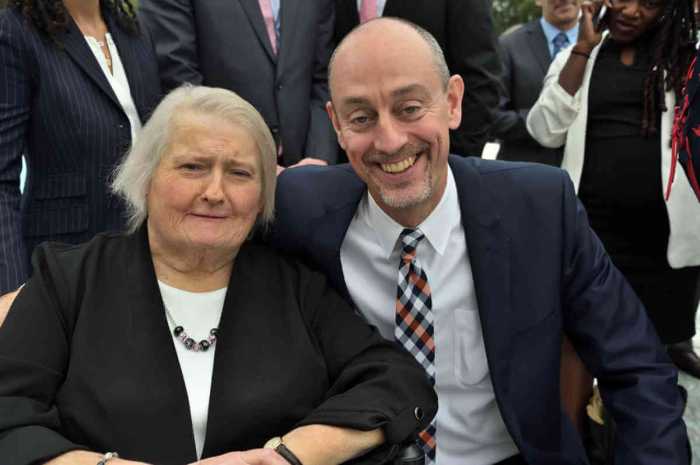The Iowa Medicaid program’s exclusion of coverage for sex reassignment procedures violates that state’s Civil Rights Act, the State Supreme Court ruled on March 8. Discrimination based on gender identity in public accommodations has been part of Iowa’s Civil Rights Act since 2007.
Justice Susan Christensen, who wrote for the court, rejected the Department of Human Services’ argument that it is not a public accommodation and that the existing exclusion is not discriminatory because reassignment surgery is a subset of cosmetic surgery, which Medicaid does not cover regardless of gender identity.
Other courts have struck down similar exclusions based on constitutional arguments or interpretations of the federal Affordable Care Act, but the Iowa ruling focused on the specific definition of public accommodation in a ruling with potentially wider impact on the state Civil Rights Act’s applicability to state and local government policies affecting LGBTQ people in Iowa.
The state’s high court ruling combined two separate cases. The plaintiff in one, 29-year-old Eerieanna Good, is a Medicaid participant who has been living as a woman since 2010, was formally diagnosed with gender dysphoria in 2013, and a year later began hormone therapy. Based on depression and anxiety she was experiencing due to her gender dysphoria, her doctors determined that surgery is medically necessary. In January 2017, Good applied for Medicaid coverage of the recommended surgery.
The other plaintiff, Carol Beal, is a 43-year-old transgender woman and Medicaid participant who began living as a female at age 10 and began hormone therapy in 1989. She, too, continues to experience depression and anxiety stemming from her gender dysphoria, and her doctors agreed that surgery is medically necessary. She sought Medicaid coverage in June 2017.
Iowa’s Medicaid program has refused to cover sex reassignment procedures for decades, even before it established formal rules on the matter. In 1980, the Eighth Circuit Court of Appeals ruled that the state’s informal policy of characterizing sex reassignment surgery as “cosmetic” was “improper.” That ruling led, in time — 1995 — to the state Department of Human Services adopting a formal rule that the Medicaid program would not cover “sex reassignment procedures” and “gender identity disorders.”
The question for the state high court was whether the 2007 amendment to the Iowa Civil Rights Act trumped the Medicaid regulation.
When Good and Beal took the state to court, Polk County District Court Judge Arthur E. Gamble ruled in their favor on multiple grounds, concluding that the Department of Human Services is a public accommodation subject to the ban on gender identity discrimination, and that the Medicaid regulation violates the Civil Rights Act.
Gamble also found that the regulation violates the State Constitution’s Equal Protection Clause and that the coverage exclusion “had a grossly disproportionate negative impact on a private right and was arbitrary and capricious.”
The state appealed, challenging Gamble’s conclusion on the public accommodation question and arguing that the regulation is not discriminatory in any event.
The Supreme Court rejected both arguments. Public accommodation, as defined in the Civil Rights Act, Justice Christensen pointed out, “includes each state and local government unit or tax-supported district of whatever kind, nature, or class that offers services, facilities, benefits, grants, or goods to the public, gratuitously or otherwise.” Medicaid is a “benefit or grant,” she noted.
On the question of the state excluding, in blanket fashion, “cosmetic, reconstructive, or plastic surgery… performed primarily for psychological purposes,” Christensen noted that the Medicaid program does provide coverage for “revision of disfiguring and extensive scars resulting from neoplastic surgery” and “correction of a congenital anomaly.” The same procedures, however, are forbidden to transgender participants for what their doctors deem medically necessary treatments for their gender dysphoria.
Having affirmed the Polk County court’s ruling on statutory grounds, the Supreme Court refrained from taking on the constitutional questions raised in District Court Judge Gamble’s opinion.
The decision is a big victory for transgender residents of Iowa. Good and Beal were represented by the American Civil Liberties Union of Iowa, the ACLU Foundation LGBT & HIV Project, and pro bono attorneys from Nixon Peabody in Chicago.




































